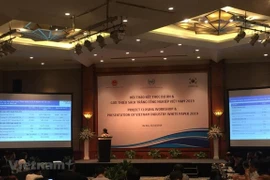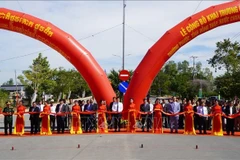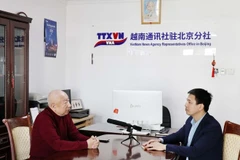Hanoi (VNA) – Most of Vietnamese economic groups have still been driven by the exploitation of natural resources like oil and gas, coal, minerals and forests, which is labour intensive.
 Most of Vietnamese economic groups have still been driven by the exploitation of natural resources like oil and gas, coal, minerals and forests. (Photo: VietnamPlus)
Most of Vietnamese economic groups have still been driven by the exploitation of natural resources like oil and gas, coal, minerals and forests. (Photo: VietnamPlus)
The Fourth Industrial Revolution has exerted huge impacts on developing countries that are pursuing industrialization, including Vietnam. The State-own economic sector, which is performing the locomotive role in the national economy, will likely to suffer from great impacts of the Fourth Industrial Revolution.
The Central Institute for Economic Management has organised a workshop on Vietnamese businesses’ readiness for the Fourth Industrial Revolution within the framework of Aus4Reform, an Australia-funded programme aiming to boost productivity and competitiveness of Vietnam’s economy.
The workshop is set to assess the role, mission and engagement of State-owned enterprises in the Fourth Industrial Revolution, thus proposing targets and solutions for Vietnam in the new period.
Lack of mechanisms to attract talents
Trinh Duc Chieu, deputy head of the business reform and development department under the Central Institute for Economic Management, said during the first stages of the Fourth Industrial Revolution, these businesses will assume the leading role as they have large scales and received huge investments in science-technology.
However, the State-owned firms will have to face challenges since the rate of highly-qualified labourers who can catch up with the scientific-technological development has still remained low.
According to the World Bank (WB), the quality of Vietnamese labourers is marked 3.79 out of 10 points, and most of them are lack of soft skills like foreign languages and information-technology, and teamwork and communication skills.
Besides, industrialization requires State-owed economic groups to reform their operation strategies, shifting from natural resources exploitation to technology-based development.
However, in fact, most of major Vietnamese economic groups have still relied on the exploitation of natural resources like oil and gas, coal, minerals and forests, which needs a large amount of labourers, Chieu said.
The Electricity of Vietnam is one of the very few State-owned enterprises that have made preparations for the new period, with many projects on high-tech applications materialised.
Le Hai Dang, head of the development strategy of the Electricity of Vietnam, said the biggest difficulty facing the group lies with the lack of a self-autonomy mechanism to lure talents in technology. Some businesses even have to face brain drain.
State-owned and foreign-invested enterprises will be more active in issuing incentives towards talents, he said.
Besides, the Electricity of Vietnam is facing another problem regarding the labourers’ knowledge about the Fourth Industrial Revolution, block chain and artificial intelligence, Dang said, adding that the group needs to organize training courses to raise their awareness of these matters.
Encouraging digitalization
According to the Central Institute of Economic Management, the use of internet and computers among State-owned enterprises is less effective than non-State ones in some fields.
Chieu said the enhanced digitalization would help to remarkably raise revenue of State-owned enterprises, citing statistics as saying that each 1 percent increase in the number of labourers using internet will lead to a 0.82 percent hike in turnover and each 1 percent increase in the number of labourers using computer will result in a 0.87 percent hike in turnover.
He explained that digitalization helps firms improve productivity and expand market.
Given this, experts from the institute have suggested the Government employ specific solutions, including mechanisms to encourage businesses to develop technologies, make venture investment, and pour capital into innovative startups.
State-owned enterprises should carry forward their locomotive role in promoting scientific-technological capacity, they said in a report.
The Government also need to set forth policies to push ahead with digitalization among State-owned interprises so that they are not left behind.
Up to 70 percent of State-owned enterprises are expected to embark on digitalization by 2050, they said./.





























